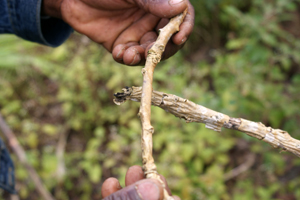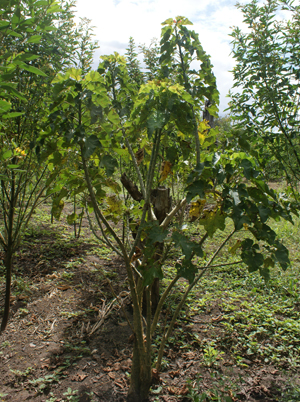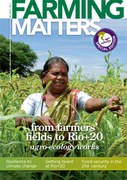In many developing countries, smallholder biofuel production and use is perceived as a promising economic opportunity to meet rural energy demands, and also as a catalyst for socio-economic development. An exploratory study in the Nhambita community in Mozambique, one of the first communities that planted Jatropha curcas at the Mozambican government’s request, analysed the potential for biofuel production within three types of farm households.

The study found that farms with high or medium resource endowment need around 20% of their total land to achieve household food self-sufficiency. Farms with poor resource endowment need 80% of their total farm size to produce sufficient food for household consumption.
Households with high resource endowment are more resilient; they have more household food reserves and find it much less difficult to feed their families throughout the year.
Also, the high and medium resource endowed farm households have more access to labour as they often hire the labour of less endowed households for agricultural activities. The land and labour constraints faced by low resource endowed households make it very difficult for them to invest in jatropha production.
High resource endowed households that grew jatropha became discouraged and stopped actively managing their jatropha fields. This was not because of land or labour constraints, but because they found the benefits of managing jatropha were less than for other crops.
As long as there are no organised markets or value chains for jatropha, it is unlikely that even this group of farmers will allocate resources to a single- purpose, non-food crop such as jatropha; the more so since they have little knowledge or experience with it and it only gives profitable yields after three to four years.
The way in which the Mozambican government promoted jatropha production in Nhambita led to disappointing results that negatively affected farmers’ trust in the biofuel crop.
Biofuel strategies for smallholders must take account of the specific context in which farming takes place, the complexity of different farming strategies and their synergies at community level.
Furthermore, it is essential to create an enabling environment for experimentation and to provide institutional support for capacity building, sharing knowledge and experiences and market development. The study also revealed several opportunities: jatropha oil is suitable for manufacturing soap and for lighting – which are among the main expenditures for Nhambita households – and the jatropha press-cake and fruit coats can be used as an organic fertilizer.
Ex-ante assessment tools should be used to strategically assess the potential and impact of agricultural policies and interventions before promoting them among smallholder farmers. This would prevent such interventions – whether for biofuel production or other green economy initiatives – from being a threat rather than an opportunity for smallholders.
Text: Marc Schut, Annemarie van Paassen, Cees Leeuwis, Sandra Bos, Wilson Leonardo and Anna Lerner
Marc Schut (marc.schut@wur.nl) works as a post-doctoral researcher at the Department of Communication and Innovation Studies of Wageningen University and Research Centre (WUR), the Netherlands.
Annemarie van Paassen and Cees Leeuwis work at the Department of Communication and Innovation Studies, WUR.
Sandra Bos works for the FACT Foundation, Wageningen,
Wilson Leonardo is doing PhD research with the Plant Production Systems Group at WUR and
Anna Lerner is Energy and Climate Change Specialist, World Bank, Washington D.C., U.S.A.


